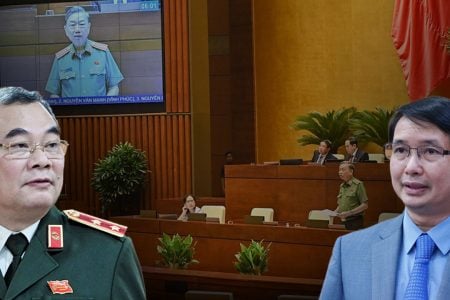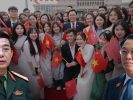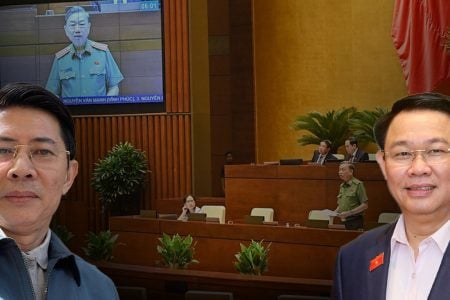
A legal expert told RFA that recent arrests and interrogations of the self-nominated candidates for Vietnam’s National Assembly are raising concerns among those who want to have their voices in the country’s parliament or the People’s Councils in provinces and cities for fear of the Party taking part in politics.
In less than a month, Vietnam probed and arrested two self-nominated candidates of the 15th National Assembly, Le Trong Hung, and Tran Quoc Khanh, accused of “making, possessing, distributing or propagating information, documents and articles to oppose the State of the Socialist Republic of Vietnam” according to Article 117 of the 2015 Criminal Code.
Mr. Trinh Huu Long, founder, and editor of the Journal Legal Initiative, commented to RFA:
“I think no matter what the government’s intentions are, the social effect it causes is the fear of greed in society as a whole.
This fear of political engagement not only makes people no longer dare to stand for themselves, but also makes people not dare to criticize, speak up, and claim legitimate rights in everything. The signals emanating from these things are clear: politics is the work of the Party and the State, civilians do not have affairs in it.
Another signal that I think is significant, is that the common people see, the Party is in the upper hand and does not care about all the powers at home and abroad, including the governments of big countries.
These signals extinguish the will to protest of, I suppose, most people.”
Recently, the Cham poet – Dong Chuong Tu – whose real name is Nguyen Quoc Huy, was detained by police for more than 4 days, from April 7 to April 10, after he said he would run for himself for the parliament election on Facebook personal page.
Two friends of poet Dong Chuong Tu, Nguyen Van Son Trung and Mr. Tran Duc Tin were also arrested and detained for several days by the police of Binh Thuan province. These two men had many articles criticizing leaders on social networks, and also announced their self-nomination.
Trung told RFA on April 14 that he was detained by the police for five days to interrogate and question the contents of his personal page as well as his plan for self-nomination for the National Assembly that Mr. Son and the group of friends have discussed.
Another independent candidate who was just eliminated in the local round of negotiation is Professor Nguyen Dinh Cong. Not everyone can attend the voter meeting, he said. Voters present at this meeting were carefully selected and the meeting was not public.
Meanwhile, Mr. Hau A Lenh, Vice Chairman and Secretary-General of the Central Committee of the Vietnam Fatherland Front once said that this National Assembly election is “very open” for self-nominated candidates.
Lawyer Nguyen Van Dai commented on the representative of the Fatherland Front:
“They say that we must understand there are two meanings. The first is only ‘open door’ to self-nominated candidates who may be supporters of the Vietnamese Communist regime. For such subjects, it is not only to “open the door,” but to be encouraged.
But for independent voices, or opposing voices, or dissidents that people stand for, they are not welcome. Then they find ways to eliminate their candidacy. For example, a lot of people were arrested when they declared to run for the National Assembly.”
In early April, the state media announced the report of the Fatherland Front (Fatherland Front) on the National Assembly election, saying that in Hanoi, there are 6 people who self-nominated for the National Assembly withdrew, 11 people who were running for the Hanoi City People’s Council also withdrew their application.
Lawyer Nguyen Van Dai commented on this information:
“It is definitely not here that these people voluntarily withdraw. Because before they run for election, they have thought it through carefully before they decide to run for office. So they were definitely threatened.
I have seen many things. In Vietnam, the security, the police and all kinds of actors will come to convince them that they should withdraw, use the example of those who have been arrested, the self-nominated candidates will withdraw.”
Arrested under the law but violates human rights
Mr. Trinh Huu Long, Founder, and Editor-in-Chief of the Journal of Legal Initiatives commented to RFA that the arrests are legal in legal terms, as the Vietnamese government has produced a full range of the kind of laws that serve as the basis for those arrests. But there are two other aspects:

“One is that the Constitution guarantees citizens’ right to participate in politics, including self-nomination and freedom of speech. If we do not include Article 4, the wording of the Vietnamese Constitution is quite synchronous with international human rights law.
It is only regrettable that Article 4, along with Vietnamese political practice, nullifies all those beautiful human rights provisions. Without an independent court to interpret the Constitution rationally, everything in Vietnam is just a story of politics and interests.
The second is in terms of written law, including the Constitution. Granted that this arrest is constitutional, legal, is it reasonable? Is it consistent with common sense? I don’t think so.
It is not because of allegations of anti-state propaganda, anti-government crimes, or many other provisions designed to guarantee the interests and power of a small group of rulers and sacrifice the interests of the rest of the public.
This completely goes against the rule of law that everyone is equal before the law. It gives birth to a group of people who always sit above the law and use the law to rule the rest of society.”
Amnesty International on April 1 released a press release condemning the Vietnamese government for conducting a crackdown before the National Assembly elections scheduled to take place next May.
Ms. Emerlynne Gil, Regional Deputy Director for Research at Amnesty International, was quoted in the press release: “The Vietnamese authorities must stop repression and allow people in Vietnam to exercise their human rights without fear of retaliation …. When Vietnam wanted to run for the United Nations Human Rights Council itself, the authorities were again involved in blatant violations and widely in Vietnam.”
What do National Assembly members say?
Mr. Le Van Cuong, a member of the 11th and 12th National Assembly, highly appreciated the investigation of “early detection of wrongdoing” by self-employed people who were detained in recent years. According to him, if these people are allowed to become members of the National Assembly before being arrested, it will discredit the National Assembly:
“My view is that with violators, security agencies find out that it is clear to suspend the rights to be nominated. This is an issue of early detection of law violations to prevent them from being in the first place, avoiding the situation that, after entering a National Assembly, when discovering, will affect the reputation of the National Assembly.
I appreciate that the security agencies have made them not eligible before they were National Assembly members. If the authorities let them become parliamentarians before being arrested, it will affect the reputation of the National Assembly.
Freestanding is the right of the people according to the Constitution and the law. But the law also stipulates that when individuals have signs of crime, the authorities have decisions to investigate violations.
Those cases are to be paused, not followed the same steps as ordinary citizens. Although not convicted by the court, but there are unusual signs that must definitely stop, not proceed for being voted.”
Lawyer Nguyen Dang Trung, member of the 12th National Assembly declined to comment on this topic when asked:
“I have no opinion on this!”
Mr. Bui Van Cuong, a member of the party’s Central Committee and General Secretary of the National Assembly cum Head of the Office of the National Assembly, a member of the 14th National Assembly for the 2016-2021 term, did not answer because he was on the plane.”
At the third consultation meeting on April 16, Chairman of the Central Committee of the Vietnam Fatherland Front, Do Van Chien, said that the number of non-Party self-nominated people this time was 75, the lowest in the elections recently.
The new National Assembly of Vietnam is expected to have 500 delegates. The goal is that between 5 and 10% of the delegates are non-Party members.
Although representatives of the Vietnamese Fatherland Front called for outsiders to join the candidacy, it seemed that party loyalty was included in the criteria. In an interview with VOV at the end of February, Mr. Ngo Sach Thuc, Vice Chairman of the Central Committee of the Fatherland Front, said that there are many individuals outside the Party who have not joined the Party for many reasons but always agree with the innovative line of the Party. Mr. Thue said that these people should be encouraged to stand for election.
Thoibao.de (Translated)





























